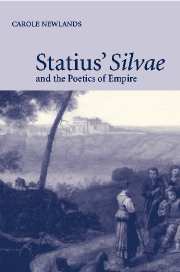Book contents
- Frontmatter
- Contents
- Acknowledgments
- 1 Introduction
- 2 Embodying the statue: Silvae 1.1 and 4.6
- 3 Engendering the house: Silvae 1.2 and 3.4
- 4 Imperial pastoral: Vopiscus' villa in Silvae 1.3
- 5 Dominating nature: Pollius' villa in Silvae 2.2
- 6 Reading the Thebaid: Silvae 1.5
- 7 The emperor's Saturnalia: Silvae 1.6
- 8 Dining with the emperor: Silvae 4.2
- 9 Building the imperial highway: Silvae 4.3
- References
- Index locorum
- Index of subjects and proper names
4 - Imperial pastoral: Vopiscus' villa in Silvae 1.3
Published online by Cambridge University Press: 22 September 2009
- Frontmatter
- Contents
- Acknowledgments
- 1 Introduction
- 2 Embodying the statue: Silvae 1.1 and 4.6
- 3 Engendering the house: Silvae 1.2 and 3.4
- 4 Imperial pastoral: Vopiscus' villa in Silvae 1.3
- 5 Dominating nature: Pollius' villa in Silvae 2.2
- 6 Reading the Thebaid: Silvae 1.5
- 7 The emperor's Saturnalia: Silvae 1.6
- 8 Dining with the emperor: Silvae 4.2
- 9 Building the imperial highway: Silvae 4.3
- References
- Index locorum
- Index of subjects and proper names
Summary
Magnae numina Romae
non ita cantari debent, ut ovile Menalcae.
Calpurnius Siculus, Eclogue 4. 10–11If you possessed too delightful (amoenior) a villa in Domitian's reign, Pliny tells us in the Panegyricus, the emperor was likely to snatch it away for his own private use. The Silvae, however, do not seem to suggest that owning a fine villa under the last of the Flavians was a risky investment. Rather, four of these poems (1. 3, 2. 2, 2. 3, and 3. 1) openly celebrate the villas of Statius' friends and enthuse over their superb location and landscape design, their opulent decoration, their contemporary amenities, and their privacy. If it seems prudent to discard here Pliny's image of the acquisitive, tyrannical emperor, nonetheless, as we shall see, in Statius' descriptive poems the emperor and the villa are not unrelated. Although these poems offer little in the way of systematic architectural detail, they provide yet another site for meditation upon the relationship between imperial and poetic authority.
Statius' villa poems testify to a new important notion in imperial culture, namely, as Bodel puts it, ‘that the domestic environment in which a gentleman cultivated his leisure was itself worthy of poetic commemoration.’ Indeed, with these poems about the Roman villa, Statius became the founder of a new poetic genre, the villa or country-house poem. But this literary innovation has not been widely recognised. Indeed, these poems have been eclipsed by the fame of Pliny's letters on his villas (especially 2.17 and 5.6) and Martial's epigrams on rural life.
- Type
- Chapter
- Information
- Statius' Silvae and the Poetics of Empire , pp. 119 - 153Publisher: Cambridge University PressPrint publication year: 2002



